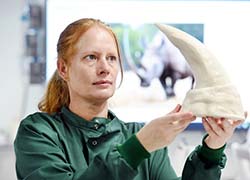Can insoles improve balance and walking in people with Multiple Sclerosis?
Researchers at Teesside University are leading a pioneering project to see if wearing specially textured insoles can improve the balance and walking ability of people with Multiple Sclerosis (MS).
Researchers at Teesside University are leading a pioneering project to see if wearing specially textured insoles can improve the balance and walking ability of people with Multiple Sclerosis (MS).
Dr John Dixon, a Reader in the School of Health & Social Care, together with PhD student Jenny Baron and Professor Denis Martin are leading the three year project after securing a £96,000 research grant from the Multiple Sclerosis Society.
Walking difficulties are among the most common mobility limitations for people with MS and two thirds of sufferers eventually need some kind of mobility device, such as a cane, walker or scooter.
It is hoped the research will lead to people with MS becoming more active and help to improve their quality of life.
Dr Dixon was involved in previous research studies that found specially textured insoles improved balance in older people and also had some effect on the gait – walking ability of people with MS.
Along with Jenny and researchers from America, Australia and New Zealand, he is now adapting the research to determine more precisely what the benefits could be for MS sufferers.
'People with MS have to deal with balance and gait problems, which often prevents them from being as active as they would like,' explained Dr Dixon.
'They also have difficulty detecting sensations and that is where we are hoping the textured insoles could help.
'We are looking to see if different types of insoles stimulate the receptors in the sole of the foot and provide additional sensory information to aid balance and gait.'
The research team will monitor 100 MS sufferers – of varying ages and mobility – using three different kinds of textured insoles. They will be asked to wear the insoles for three months and keep a diary of their activities.
Their walking patterns will be tested at the beginning of the process and throughout the trial using a GAITRite system, which provides detailed analysis of all aspects of a participant’s walking technique.
Jenny, who is originally from Edinburgh, studied a master’s degree in physiotherapy at Teesside and is looking forward to putting her knowledge into practice in a research project that could have a significant, positive impact on people’s lives.
'A project like this is all about making a difference and coming up with solutions to specific problems,' said Jenny.
'One of the main problems for MS sufferers is that they stop being active. If this research helps to give them more confidence in their walking ability and encourages them to be more active, it could greatly improve their quality of life.'
Ed Holloway, head of research at the MS Society, said: 'The results of this project could help improve balance and walking problems in a low cost and effective way for people who have MS - this is crucial in helping people with MS remain independent.'
 Wildlife expert puts Teesside University research in the
...
Wildlife expert puts Teesside University research in the
... Teesside University students creating AI controlled
...
Teesside University students creating AI controlled
... Teesside academic helps set the standard for Anthropology
Teesside academic helps set the standard for Anthropology